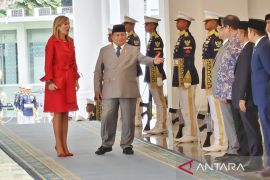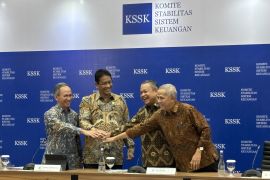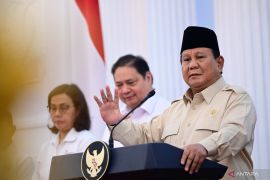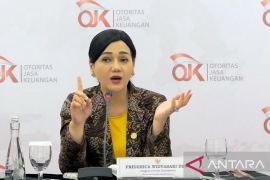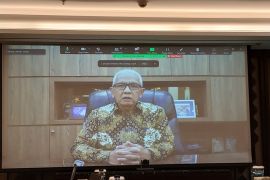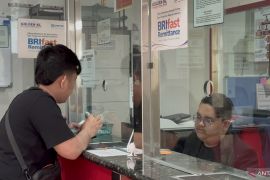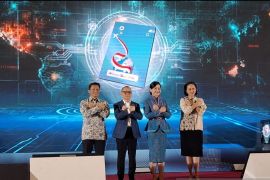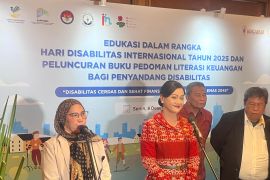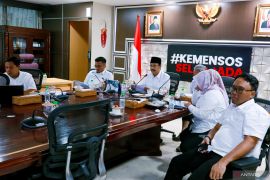The program offers work competency development and entrepreneurship in the form of financial assistance aimed at job seekers, workers who have been laid off, or workers who need competency improvement, including micro and small businesses.
Hence, it translates to the fact that the program not only offers skills development as a means to seize new job or entrepreneurship opportunities but is also able to increase financial inclusion in the country.
Executive Director of the Pre-Employment Card Program Denni Puspa Purbasari remarked that apart from being a semi-social assistance program to help people whose livelihoods were affected by the pandemic, the Pre-Employment Card Program was also a game changer to expedite Indonesia's financial inclusion.
The Pre-Employment Card Program is proof of the concept in various literature regarding the importance of formal financial services for people from the lowest economic groups or often called financial inclusion. This includes the advantages of financial technology (fintech) over banks in lowering costs and increasing speed, reach, and transparency.
The program uses the Government to Person (G2P) system in distributing its social assistance and is also referred as the third generation model, or G2P 3.0.
"This is the most advanced model today," Purbasari noted.
The first generation, or G2P 1.0, was a cash assistance distribution model, followed by the second generation, or G2P 2.0, which used digital distribution, but left no choice for users.
In a study conducted by the Management of the Pre-Employment Card Program (MPPKP) and the World Bank in 2022 regarding the experiences of participants implementing the G2P system, it was found that 88 percent of beneficiaries preferred to use a digital wallet account to receive post-training incentives, while the rest chose a bank account.
Furthermore, a study by the National Team for the Acceleration of Poverty Reduction (TNP2K)-World Bank showed that 50 percent of the 2022 Pre-Employment Card recipients opened an e-wallet account for the first time and 8.7 percent opened a bank account for the first time.
Although there are several new users, 96.4 percent of the recipients are satisfied with the non-cash method in the Pre-Employment Card Program since it offers several choices, practical, transparent, and without deductions.
First e-wallet experience
The first experience of using a digital wallet, or e-wallet, was by one of the recipients of the Pre-Employment Card Program from Sintang District, West Kalimantan, Ledia Agustina. She stated that this was the first time she used an e-wallet when she was accepted as a Batch 12 in the 2021 Pre-Employment Card Program.
“In order to receive the incentives, we were offered to use banks and e-wallets. In my generation, there was only one bank choice, so I chose the e-wallet because I did not have a bank account. That was the first time I used it, and it was convenient to open an account,” she remarked.
After using an e-wallet, she also found an opportunity to increase her income by selling phone credits and electricity tokens. She did this when she saw that the price of phone credits that were usually sold in her area was higher than those purchased from the e-wallet.
"Initially, the e-wallet was used to buy phone credit and electricity tokens for personal needs, then I decided to use it to accommodate people’s needs in purchasing those two. The e-wallet also offered cashback, not bad for some extra money,” she added.
Another recipient, Putri Puspita Lokanazea, also had her first experience in using an e-wallet. The batch 1 Pre-Employment Card participants said they were self-taught to use various features in digital wallets to take advantage of the incentives they received.
In the past, she did not see the use of e-wallets, considering that there were only stores and merchants that used them.
Currently, this 29-year-old woman has become a loyal user of the digital wallet, considering the ease of use, especially in transactions.
"Moreover, in Banda Aceh, many people are using digital wallets," she remarked.
The first encounter with digital wallets was also experienced by another participant, Nawardus Faot. He said that the digital wallet helped him to take part in every training provided in the program.
The 24-year-old man from West Kalimantan has been actively using a digital wallet since he joined the Pre-Employment Card Program to take training in using Microsoft Excel and Word and how to prepare himself for job interviews.
As time went on, Faot saw opportunities to increase his income by using digital wallets, such as selling phone credit and clothing.
“When I started my business using an e-wallet, I sold phone credits at lower price than others,” he remarked.
The opportunity helped him to utilize the incentive fund he received that he used to survive while looking for work.
From the incentives and income from selling, he was able to support himself before finally getting his first salary after getting a job.
“The income was decent. It helped me to get through when I had not received a salary from my job,” he remarked.
The digitalization concept applied in the implementation of the Pre-Employment Card Program has become a success story for the government in increasing financial inclusion. By utilizing digital platforms, people do not need to go through a lengthy bureaucracy to get incentives.
Since it was launched in 2020, the Pre-Employment Card could encourage socio-economic recovery, financial inclusion, and strengthening sustainable digital transformation.
The results of Presisi Indonesia's research in November 2021 showed that the Pre-Employment Card had helped recipients to increase their financial knowledge.
In the survey held from September 24 to November 11, 2021, pre-employment and 50 percent of non-beneficiaries found that the Pre-Employment Card Program helped recipients to increase their financial knowledge.
As many as 80 percent of the Pre-Employment Card participants opened a bank account and e-wallet for the first time.
"About 72 percent of these Pre-Employment Card recipients use e-wallets as an account to receive incentives for Pre-Employment Cards," Senior Researcher in Presisi Indonesia Widdi Mugijayani said.
She also noted that the Pre-Employment Card Program was correlated with increasing financial inclusion, especially for e-wallet and account ownership of around 22 percent.
As of November 2022, the Pre-Employment Card Program had benefited 16.4 million people in 514 districts and cities throughout the country.
Applicants take training courses, receive certificates, search for job vacancies, and apply for jobs, all of which are done 100-percent online, without space and time restrictions.
Related news: Pre-Employment Card Program encourages financial inclusion: Maxima
Related news: Pre-Employment Card Program helps women entrepreneurs
Related news: Pre-Employment Card program supported by strong tech infrastructure
Translator: Zubi Mahrofi, Resinta S
Editor: Azis Kurmala
Copyright © ANTARA 2022

